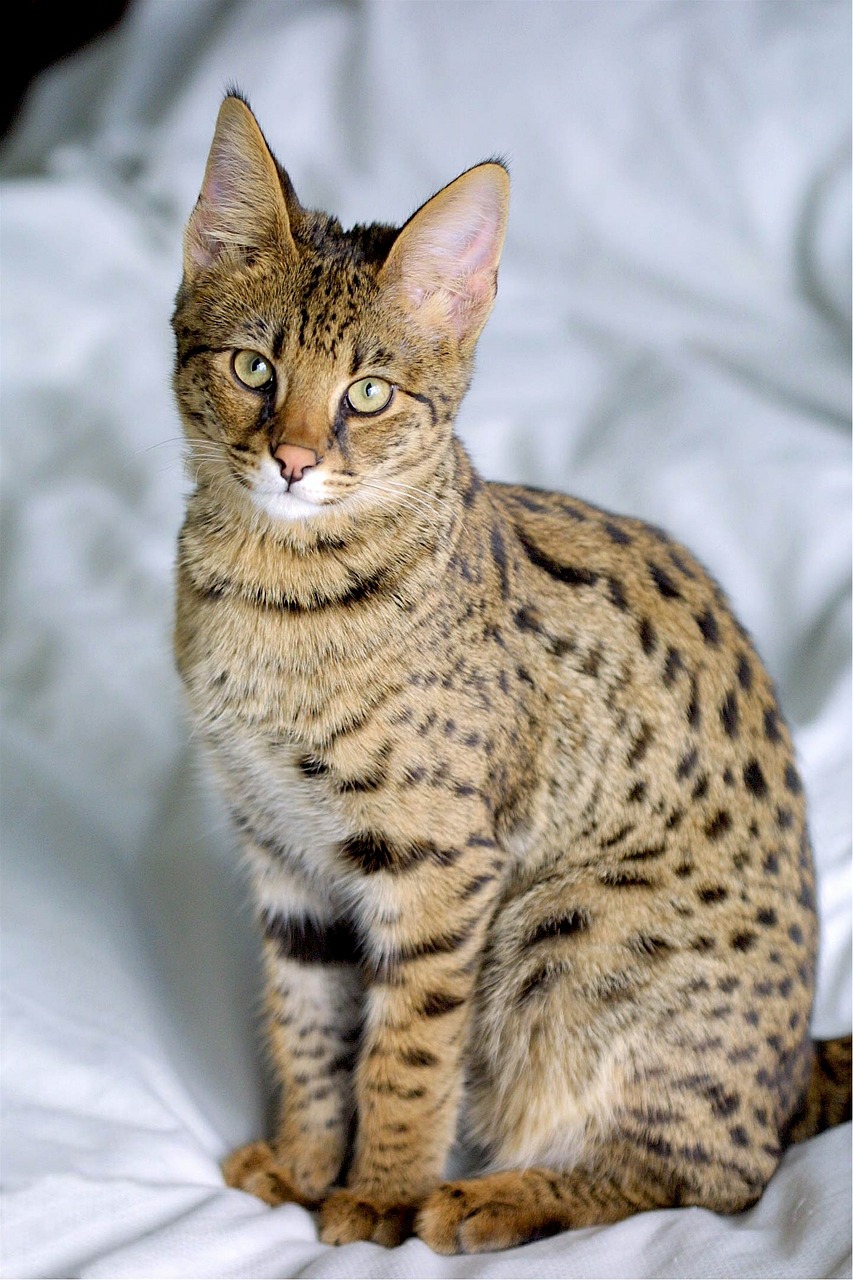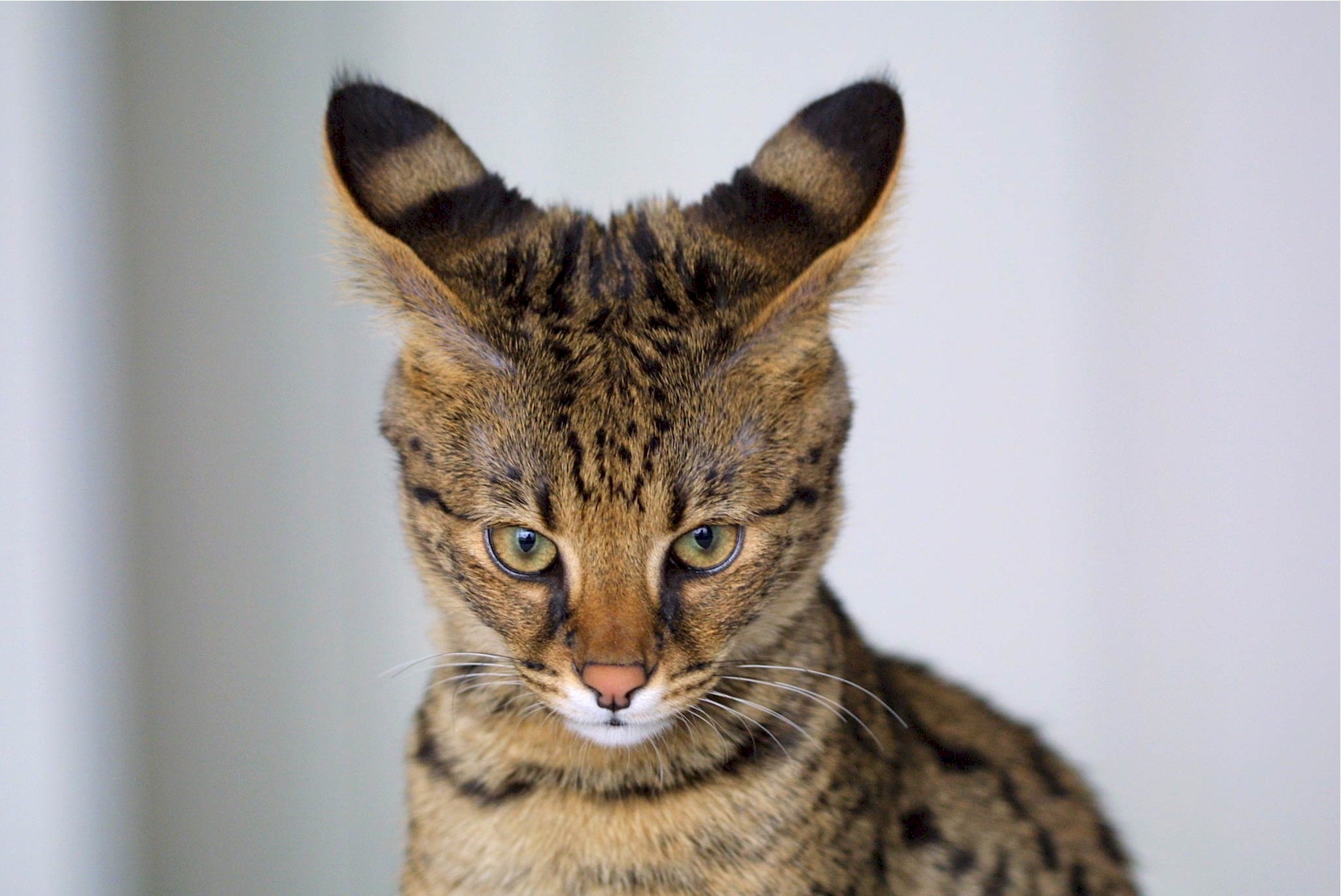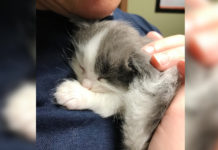A beautiful and sleek breed with elements of Bengal and a hint of a wild streak. It can only be the unique and wonderful Savannah cat.
The Savannah Cat In Brief
The name Savannah was derived from the first example of the breed, a kitten named Savannah  born in 1986. The result was a cross between a medium-sized African wildcat called a Serval and a regular domestic short haired cat. The breed’s development was overseen by breeders Joyce Stroufe and Patrick Kelly.
born in 1986. The result was a cross between a medium-sized African wildcat called a Serval and a regular domestic short haired cat. The breed’s development was overseen by breeders Joyce Stroufe and Patrick Kelly.
That first kitten and her offspring were crossed with a variety of breeds including Egyptian Maus, Bengals and both Oriental and domestic shorthairs, finally arriving at the distinctive Savannah cat we know and recognize today.
The Savannah is a graceful, long-bodied cat with an impressive posture and long limbs. The head is small by conventional proportions and is slightly longer than it is wide. The ears tend to be large with a layer of fine hairs lining the inside
What’s the Temperament of a Savannah Cat?
First and foremost, the Savannah cat is renowned for its friendly nature. This is as true of strangers as with people known to them. They’re confident cats that will happily stride up to your guests to see what they’re about.
Many owners say that Savannahs possess many dog-like qualities. They possess many similar behavior and will follow you around the house just as a dog would. They also exhibit a high degree of loyalty which is something uncommon in most cats.
This is an athletic, curious and highly adventurous cat that loves to explore and find new and hidden places. They’re exceptionally well suited to walking on a leash and your Savannah will certainly let you know where it wants to go.
Additionally, the Savannah is an impressive gymnast and will seek out high places with one of their trademark leaps. You should provide a good sized cat tree if you don’t want your furniture turned into an impromptu cat assault course.
Savannahs possess great intelligence and frequently play tricks on their owners. You might as well think of them as small children and seek to child-proof your home as if that were the case. For that reason you may need to change faucet fittings to avoid any unexpected watery surprises, or fit child-lcoks to cupboard doors.
To keep your Savannah happy and your possessions intact you should plan to invest in plenty of sturdy, hard-wearing toys. They respond well to and depend on activities that stimulate both body and mind and your company is important to them. If you’re looking for a more passive cat experience this may not be for you.
A Quick Look at the Savannah Cat in Action
Savannah cats are playful and boisterous and loaded with personality. Their wild ancestry shouldn’t be off-putting and you’ll know how great their temperament is if you have the pleasure of meeting one in the flesh.
Health
This is a predominantly healthy breed with no recognized genetic problems caused by the breeding programme. However, the Savannah is still a relatively new breed and as such there may be aesthetic imperfections that result in an unexhibitable cat. However, it’s nothing that affects the health and happiness of the cat.
Care
Caring for your Savannah is along the same lines as most domestic cats. Brush the coat once or twice per week with a soft brush. This will help to remove dead hair and exfoliate the skin. Savannahs don’t have any specific dental requirements, but as with most breeds regular brushing helps to keep their teeth in good condition.
Savannahs love the outdoors and will readily use a cat flap. The obvious caveats apply to providing your cat with outdoor access. Acclimatize them to your home first then provide limited access to a secure area, perhaps a garden or enclosed yard. Use a leash and harness if necessary. Soon your cat will have the lay of the land and return to you after an adventure.
If you’re a bit apprehensive about allowing your Savannah outside then take it for regular walks. They adapt well to walking on a leash. If it’s practical, provide access to an enclosed outdoor run to satisfy the curiosity.
What are the Exercise Needs of a Savannah Cat
The Savannah is an athletic and spirited cat. Because of that it requires plenty of stimulation and exercise. In quiet neighborhoods with no traffic or semi-rural environments with no predators you can achieve this by allowing access to the outdoors. Given half a chance, Savannahs happily climb trees all day long and are skilled hunters.
If you keep your Savannah indoors you should definitely provide a substantial cat tree for it to play on. They love to leap and you’ll find your Savannah perched in unusual places around the house. An indoor Savannah absolutely loves to play and it’s essential that you invest in some fairly resilient cat toys.
One of the best ways to provide exercise for your Savannah is actually to have more than one Savannah. Most breeders agree that these cats get on better as a pair, and the natural interaction and playtime between the cats will go a long way to meeting their exercise needs.
The Cost of a Savannah Cat
Savannah cats come in a variety of classifications, from F5 up to F1. The cost of your cat will vary according to which classification it is along with whether it’s male or female. The classification relates to what percentage of Serval has in its genetic make up. The more Serval there is the more costly the cat. You can find a summary of Savannah cat price below:
| F1 Savannah | $12,000 – $16,000 | $15,000 – $20,000 | ~ 50% |
| F2 Savannah | $4,000 – $8,000 | $4,000 – $9,000 | ~ 30% |
| F3 Savannah | $1,500 – $4,000 | $1,000 – $4,000 | ~ 19% |
| F4 Savannah | $1,000 to $2,500 | $1,000 to $2,500 | ~ 15% |
| F5 Savannah | $1,000 – $2,500 | $1,000 to $2,500 | ~ 11% |






[…] […]